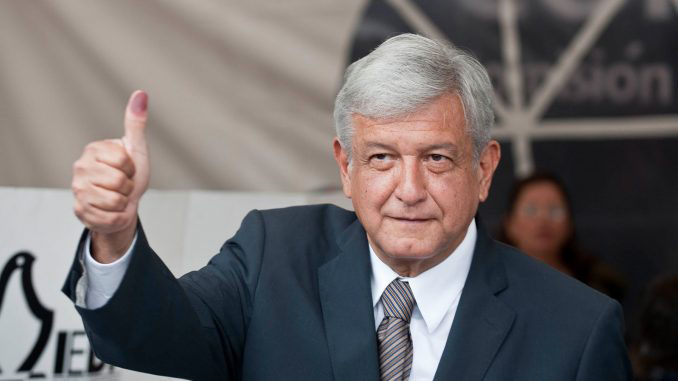 A joke making the rounds in Mexico says that President Donald Trump has become the de facto campaign manager of leftist populist candidate Andres Manuel Lopez Obrador, who is leading in the polls for the July 1 presidential election.
A joke making the rounds in Mexico says that President Donald Trump has become the de facto campaign manager of leftist populist candidate Andres Manuel Lopez Obrador, who is leading in the polls for the July 1 presidential election.
Knowingly or not, Trump gave a big boost to Lopez Obrador on March 13, when the U.S. president visited the Mexican border in southern California and said that “there are some very good people” running for president in Mexico, and “some that aren’t that good.”
Predictably, the banner headline in some of Mexico’s leading newspapers the next day was “Trump says some Mexican candidates aren’t that good.” You didn’t need to be a political scientist to guess that the U.S. president was referring to Lopez Obrador, the most vocal Trump critic among Mexico’s leading presidential hopefuls.
For Lopez Obrador, being tacitly criticized by Trump was a badge of honour. Following Trump’s repeated insults against Mexico since he started his campaign in 2015 declaring that most Mexican undocumented immigrants are “criminals” and “rapists,” the U.S. president has become one of the least popular foreign leaders in Mexico in recent memory.
Ninety-four percent of Mexicans oppose Trump’s plan to build a border wall, and only 5 percent support Trump’s overall foreign policy, according to a Pew Research Center poll.
If Trump goes beyond his recent comment and criticizes Lopez Obrador by name before the Mexican election, he may get him elected.
It’s even possible that Trump would not mind a Lopez Obrador victory. It would vindicate Trump’s narrative that Mexico is a hostile country full of “bad hombres,” and that — as The Washington Post reported he said in a fundraiser — it’s a “spoiled” country when it comes to trade practices.
If Lopez Obrador wins and meets his vow to respond harshly to Trump’s tirades against Mexico, Trump would be able to tell his base: “You see, I told you so. Mexico is not a friendly nation.” The two nationalist-populist presidents would feed one another — and help each other with their respective political bases — with an escalating war of words.
Lopez Obrador, a former Mexico City mayor, has publicly stated that he would respond more assertively to Trump’s verbal attacks against Mexico than outgoing president Enrique Peña Nieto, who has gone out of his way not to antagonize the U.S. president.
“With us, it will be different,” Lopez Obrador told the daily El Universal on Jan. 19, after Trump had falsely claimed that world rankings place Mexico as the most dangerous country on earth. “We are going to put him in his place. … Every time he does what he did today, he will have a direct response. … If he uses his Twitter, his Face (sic), I’m going to use it, too.”
Populist leaders thrive on confrontation. They need an enemy — real or imagined — to energize their base, wrap themselves around the flag, and proclaim themselves saviours of the fatherland. And for Trump, Mexico is a far less dangerous enemy than, say, North Korea or Iran.
In addition, nationalist populists like Trump and Lopez Obrador tend to use the perception of a foreign threat as an excuse to grab additional powers. And when there is no foreign threat, they often make one up.
There is a reason why Trump keeps bashing Mexico, even if Mexico has been a good U.S. ally in recent decades, and illegal immigration has been declining significantly over the past 10 years: It’s an issue that energizes the right-wing nationalist base like few others.
For Trump, it’s crucial to keep his base energized, in order to maintain the pressure on skeptical Republicans in Congress. Republican lawmakers would be Trump’s only hope of surviving a
potential congressional impeachment.
A Lopez Obrador victory would help Trump keep his fake narrative of a “Mexico threat” alive. A war of words between the two populist nationalist leaders would help both of them with their respective constituencies, even if it would be disastrous for both countries.
I, for one, do not rule out that Trump would not cry for Mexico if Lopez Obrador wins.








